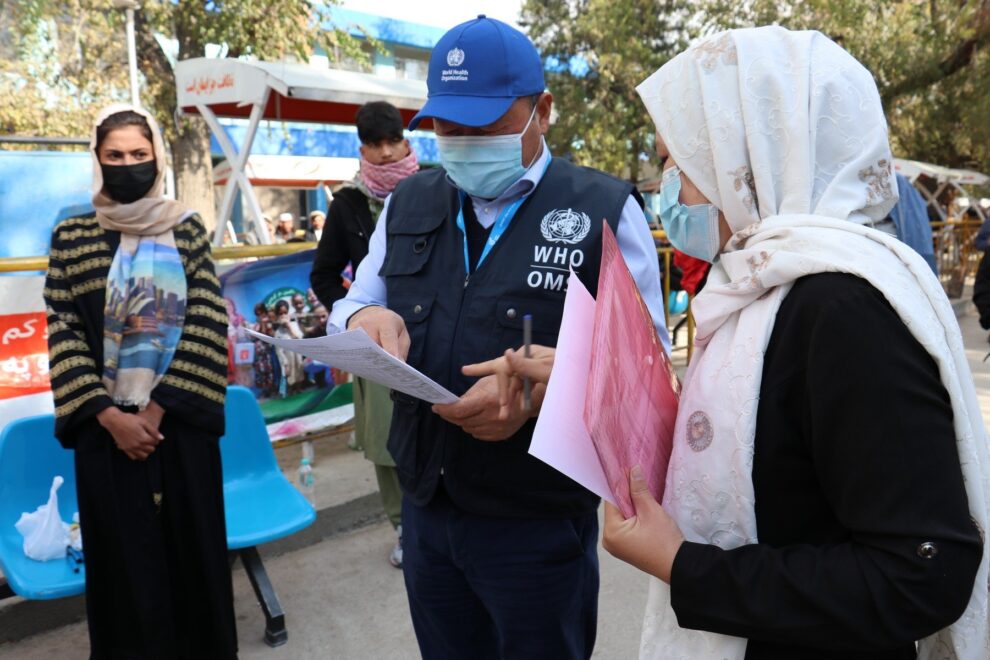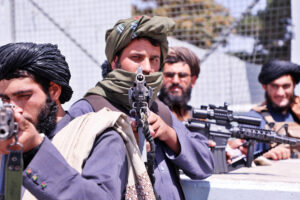24 January 2022
Visit the country situation reports page for the latest information on Afghanistan’s evolving situation and support needs
Ayesha, 29, is a midwife in a rural health facility in Afghanistan. She graduated from the provincial midwifery school supported by the government’s Sehatmandi programme, which provides essential primary care services including for maternal, newborn and child health.
“I was born in a very remote district where health facilities were not available. I witnessed many pregnant mothers dying because there was no health care facility at my village or on the way to hospitals, located more than 50 km away. I decided to become a midwife and serve the women and children in the villages. I love my job and attend numerous institutional deliveries, and have contributed to the reduction of maternal mortality,” said Ayesha.
However, these vital health services that save the lives of many in the community have come under severe threat. The Sehatmandi programme is the backbone of Afghanistan’s health system, providing care for millions of people through 2 331 health facilities. Since the Taliban gained power, major funding for the programme has been withdrawn. As of 15 January 2022, the country has received funding to help cover immediate needs for the early part of the year. More funds are needed to urgently fill remaining gaps and to support the country’s health system in sustaining the delivery of essential services.
The primary care facility in the village is vital, serving 58 000 people including 13 340 women of childbearing age and 11 600 children under-five. Importantly, it provides emergency obstetric care, including Caesarean section services. Without this, women would have to travel far, and put themselves and their babies at risk.
Due to a lack of funding, staff in the health facility have not received their salaries for months, the clinic is faced with shortages of medicine and supplies, and patients are not able to access the essential health services they need. If this facility closes down, increasing ill health and mortality is inevitable. The facility’s struggles are not unique.
Primary Health Care Under Threat
The situation is replicated across the country because the Sehatmandi programme is no longer able to receive appropriate financial support due to the change in Afghanistan’s government. In August 2021, when the Taliban took over Kabul, donors found it impossible to provide financing through the new regime, and major funding was withdrawn. Previously funded by the World Bank, the European Commission, and USAID, there are now serious challenges to continuing these vital primary health care services.
The population is also suffering due to a recent drought that has affected crops and livestock. This, combined with rising food prices and the collapse of public services, led to acute food insecurity for nearly 19 million people in September and October 2021.
Urgent Call for International Support
For two decades in Afghanistan, life expectancy has risen, and maternal, newborn and child deaths have dramatically decreased. Today, the population’s health is seriously under threat. All the progress in health outcomes may be lost. WHO is urgently calling for international donors to step up and find an alternative funding mechanism for this crucial primary health care initiative.
“The recent funding pause by key donors to the country’s biggest health programme (Sehatmandi) will cause the majority of the public health facilities to close. As a result, more mothers, infants and children will die of reduced access to essential health care. WHO is determined to work with partners in identifying a sustainable solution with the support of donors to maintain and scale up the lifesaving interventions when needed in the country,” said Dr Luo Dapeng, WHO Representative in Afghanistan
While it may be challenging to find alternative and innovative ways to support the Sehatmandi programme, it is essential for the health and lives of the population of one of the poorest countries in the world and for health security globally
About the UHC Partnership
Afghanistan is among the 115 countries and areas to which the Universal Health Coverage Partnership helps deliver WHO support and technical expertise in advancing UHC with a PHC approach. The Partnership is one of WHO’s largest initiatives on international cooperation for UHC and PHC. It is funded by the European Union (EU), the Grand Duchy of Luxembourg, Irish Aid, the Government of Japan, the French Ministry for Europe and Foreign Affairs, the United Kingdom – Foreign, Commonwealth & Development Office, Belgium, Canada and Germany.
Source: WHO
















